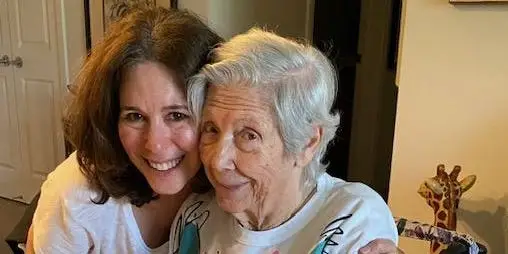“You’ll deal with it when I’m dead,” our mom said whenever my sister or I wanted to help clean up any mess in her life, whether it be the kitchen cabinets or financial entanglements. Her stubbornness irked me, but I didn’t have the heart to argue.
When she was 85, and recently widowed by her second husband, we stepped in to assist with her bills and medical needs, a job her accountant husband had facilitated through the years.
We quickly faced the painful realization that her brilliant mind was no longer as sharp as it had been. Everything was becoming more difficult for her: reading her mail, paying bills, maintaining her home. Though she was once fastidious with her files, mountains of papers were now piled on her kitchen table.
She couldn’t let go, so we had to do it for her
We begged her to let us help organize her belongings. “Not now,” she’d say. Not ever, was what she meant.
A brain scan after a fall diagnosed her with Alzheimer’s. As her mind, control, and dignity slipped away, the weight of familiar things seemed to anchor her in her rapidly deteriorating world. She clung to them like a life raft. Her vulnerability crushed us, but it wasn’t something we were going to fight her on.
When she died, it was up to my sister and me to untangle her messes. We dove in, initially surprised by her overflowing closets. They were filled to the ceiling with plastic bags filled with old sheets of bubble wrap, yellowed paper plates and cups, birthday gifts still in their boxes, and hundreds of files that we needed to search through
Her pantry was jammed with cans of soup, peas, and pasta sauce from when she had moved into her apartment in 2012. The layers of dust and decade-old cans and boxed food in her pantry saddened me.
I never saw a speck of dirt in our home as a child, but her drawers, closets, and several long-forgotten storage units were now stuffed like a Jack-in-the-Box toy ready to explode. Junk overshadowed the cherished heirlooms she left behind.
I don’t want to burden my children in the same way
My mother had great qualities: She was humorous, straightforward, and unapologetically herself, but her desire to hold onto things well past their due date wasn’t one of them. Being married to two Depression-era husbands taught her to save everything because one day you might need it. She rarely ever did.
I vowed never to repeat this behavior in my own life. I was horrified by the thought of my kids ever having to sort through my belongings, but I wasn’t sure where to start.
A friend lent me a copy of “The Essential Art of Swedish Death Cleaning.” In it, the author speaks about decluttering and organizing your belongings to assuage the painful process of your kids having to deal with the detritus of your life. The message spoke to me.
I began tackling my cabinets and drawers. Channeling Marie Kondo, I picked up each object, held it in front of me, and decided if it sparked joy. If not, I let it go.
Old clothes, mismatched dishes, and worn-out toys all went into bags. Seeing trash bags filled with items to donate or toss lightened the footprint in my home and boosted my mood.
When I die, I hope that as my grieving kids pack up my home, they’ll pause to notice the Baccarat butterfly collection catching the light, the vibrant decorative bowls and art I’ve collected, the shelves lined with beloved books, and the toys meant for my dog and granddaughter. And I hope they’ll think that I filled my world with beauty and meaning, and that I surrounded myself with things I loved as much as I loved them. That’s the legacy I want to leave behind.
Read the original article on Business Insider
The post When my mom died, sorting through her belongings was overwhelming. I won’t put that burden on my children. appeared first on Business Insider.




